

John Rawls: can liberalism's great philosopher come to the west's rescue again? Trickle-down economics doesn't work but build-up does – is Biden listening? How should the huge financial costs of the pandemic be paid for, as well as the other deferred needs of society after this annus horribilis?
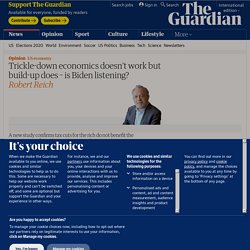
Politicians rarely want to raise taxes on the rich. Joe Biden promised to do so but a closely divided Congress is already balking. That’s because they’ve bought into one of the most dangerous of all economic ideas: that economic growth requires the rich to become even richer. Rubbish. Fifty Years of Tax Cuts for Rich Didn’t Trickle Down, Study Says. Tax cuts for rich people breed inequality without providing much of a boon to anyone else, according to a study of the advanced world that could add to the case for the wealthy to bear more of the cost of the coronavirus pandemic.

The paper, by David Hope of the London School of Economics and Julian Limberg of King’s College London, found that such measures over the last 50 years only really benefited the individuals who were directly affected, and did little to promote jobs or growth. “Policy makers shouldn’t worry that raising taxes on the rich to fund the financial costs of the pandemic will harm their economies,” Hope said in an interview.
That will be comforting news to U.K. Chancellor of the Exchequer Rishi Sunak, whose hopes of repairing the country’s virus-battered public finances may rest on his ability to increase taxes, possibly on capital gains -- a levy that might disproportionately impact higher-earning individuals. U.K. How philanthropy benefits the super-rich. Philanthropy, it is popularly supposed, transfers money from the rich to the poor.

This is not the case. In the US, which statistics show to be the most philanthropic of nations, barely a fifth of the money donated by big givers goes to the poor. A lot goes to the arts, sports teams and other cultural pursuits, and half goes to education and healthcare. At first glance that seems to fit the popular profile of “giving to good causes”.
But dig down a little. Why coronavirus might just create a more equal society in Britain. For those who are cooped up in a flat at the moment with a baby and no garden, worrying about getting the government’s 80% income replacement after losing your job, the lockdown must be almost intolerable.
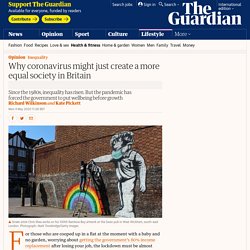
Then there is the rise in people needing food banks and in cases of domestic violence – both predictable results of lockdown. For those working at home with a secure income and a garden, it is much easier. Governments, careless of the contrasts between rich and poor, always want us to believe “we are all in this together”. Why are people from BAME groups dying disproportionately of Covid-19? One explanation for why people from black and minority ethnic (BAME) backgrounds are dying in disproportionately high numbers is demography.

The virus hit London first and hit it hardest. But even when you take these regional differences into account there is a mismatch. In particular, if you take into account that ethnic minorities are generally younger – particularly important for Covid-19 where 90% of deaths are in people over 60 – the ethnic differences become even more stark. Co-morbidities could certainly play a role. The black population, where the discrepancy appears to be greatest, is particularly afflicted with hypertension. Genetics sounds like an easy get-out clause, but it isn’t. Ethnic minorities dying of Covid-19 at higher rate, analysis shows.
The government has been urged to recognise that race and racial inequalities are a risk factor for Covid-19 after Guardian research which has revealed that ethnic minorities in England are dying in disproportionately high numbers compared with white people.
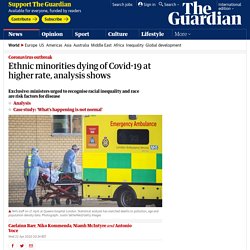
The revelation that people from minority groups appear to be over-represented among the coronavirus deaths, by as much as 27%, “confirmed the worst fears” of campaigners who said there was now no question of an excessive toll. The Guardian analysis found that of 12,593 patients who died in hospital up to 19 April, 19% were Black, Asian and minority ethnic (BAME) even though these groups make up only 15% of the general population in England.
Our social crisis is no longer just about inequality, it’s about life and death. On the face of it, it is a familiar enough story.
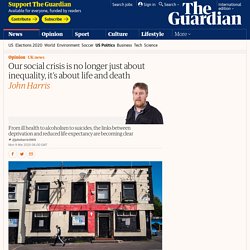
“By its end, much of the optimism of the 20th century had faded. Towns and cities … that used to produce steel, glass, furniture or shoes, and that are fondly remembered by people in their 70s as having been great places to grow up, had been gutted, their factories closed and shops boarded up.” The words are taken from a remarkable new book by the academics Anne Case and Angus Deaton. 'Outrageous': Life expectancy on Teesside is going backwards - and austerity has been blamed - Teesside Live. Stark figures show people in parts of Teesside are now expected to live shorter lives - and austerity has been blamed.
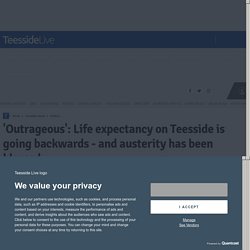
A new report claims life expectancy is now going backwards in some areas, for the first time in a century. It showed that for men in Middlesbrough , life expectancy at birth has fallen from 76.6 in 2011-2013 to 75.3 in 2016-2018. Stockton has seen the biggest drop for women, down from 82.1 in 2012-2014 to 81.4 in 2016-2018. The lost decade: the hidden story of how austerity broke Britain. What happened in the UK between 2010 and 2020 will scar us for the rest of our lives.
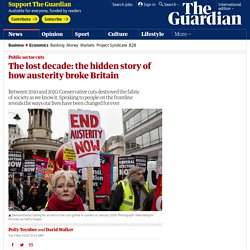
David Cameron’s Conservatives, only just victorious in the 2010 election, sold austerity as a necessary response to the 2008 financial crash. The exact social consequences of these cuts were spelled out last week in Michael Marmot’s report for the Institute of Health Equity: for the first time in a century, life expectancy has stopped growing and for women in poor areas actually fallen. We should never stop reminding ourselves just what an astonishing decade we have lived through. In the aftermath of the crash, employment climbed and stayed remarkably high.
But these new jobs paid badly and it took until two months ago for earnings to reach where they were before 2008. Victoria Derbyshire sur Twitter : "“An increase in child poverty, 1,000 Sure Start centres have closed, decreases in education funding” Sir Michael Marmot explains some of the factors on life expectancy his report has found across 6 key domains over the p.
Health Equity in England: The Marmot Review 10 Years On - IHE. Learn about our cookies Cookies are small text files that are stored in your computer and then saved by your browser.
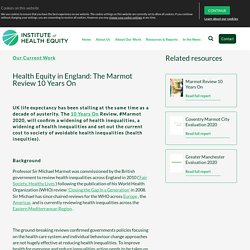
Used to collect data, cookies help make our website more user friendly, more effective and safer for you. Cookies do lots of different jobs such as letting you navigate between pages efficiently, remembering your preferences, and ensuring that adverts you see online are more relevant to your interests. Without cookies many areas of functionality, such as user logins, shopping baskets and other customisation features, will not work. Cookies cannot be attributed to a particular person and do not contain any personal information. Cookies do not cause any harm to your computer and do not contain any viruses.
You can find more information about cookies at www.allaboutcookies.org and www.youronlinechoices.eu. Change your cookie settings. How deprivation in the north has led to a health crisis. Like many areas of the north of England, residents of the Greater Manchester constituency of Heywood and Middleton – one of the so-called “red wall” seats that turned Tory for the first time at the general election – suffer poorer than average health. According to data from the House of Commons library, rates of some of the most common health conditions are higher in Heywood and Middleton than the rest of the country. Some 15.5% of the local population have been diagnosed with depression compared with an England average of 9.8%; 11.8% of adults are obese (England: 9.7%); 7.7% have diabetes (England: 6.7%); 14.7% have high blood pressure (England: 13.8%) and 2.8% have one of the progressive lung diseases known as chronic obstructive pulmonary disease (COPD) (England: 1.9%).
Painter and decorator Alexander Muresan has a lung condition and COPD. Austerity blamed for life expectancy stalling for first time in century. Life expectancy has stalled for the first time in more than 100 years and even reversed for the most deprived women in society, according to a landmark review which shows the gap in health inequalities is yawning even wider than it did a decade ago, in large part due to the impact of cuts linked to the government’s austerity policies. Sir Michael Marmot’s review, 10 years after he warned that growing inequalities in society would lead to worse health, reveals a shocking picture across England, which he says is no different to the rest of the UK and could have been prevented.
'National disgrace': tackle regional health inequality, PM to be told. Being wealthy adds nine years to life expectancy, says study. Being wealthy adds nine years to healthy life expectancy: a life free from disability and pain, according to transatlantic research. The 10-year study, conducted across the UK and US, looked at all the social and economic factors behind the reasons why people sink into ill-health as they age. “We found that socio-economic inequalities in disability-free life expectancy were similar across all ages in England and the US but the biggest socio-economic advantage in both countries and across all age groups was wealth,” said Dr Paola Zaninotto, a professor in epidemiology and healthcare at University College London, which led the research. Published on Tuesday in the Journal of Gerontology, the data from 10,754 UK adults aged 50 and older, and 14,803 US adults over 50, examined how long people can expect to live free from disabilities and to what extent socio-economic factors play a part.
The top 10 richest and poorest areas in Northern Europe - 9 of the poorest areas are in the UK. Source: Eurostat / EU.… Britain risks heading to US levels of inequality, warns top economist. Labour would trial universal basic income if elected, John McDonnell says. Labour would trial universal basic income if it wins power, shadow chancellor John McDonnell has revealed. Britain has favoured the old over the young for too long.
Older people are a nervous, anxious bunch. The private renters trapped in Britain’s new slums. The disturbing racial bias of The Greatest Dancer. Russian-trained ballet dancer Yassaui Mergaliyev steps up to perform. The new elite’s phoney crusade to save the world – without changing anything. A successful society is a progress machine. World's 26 richest people own as much as poorest 50%, says Oxfam. This graphic is insane. I keep staring at it and thinking there must be something wrong. The gap between people in the poorest parts of Britain, and the richest. (via @INorBY2020)… Middle-class 'consume more drugs and alcohol' than poorer people. Middle-class people consume more alcohol and illegal drugs than those living below the poverty line, according to a report by a cross-party group of academics and campaigners.
Seaside towns are 'hotspots' for heroin deaths, says ONS. The town that’s found a potent cure for illness - community. Disadvantaged pupils achieve lower grades in north than in London. Top Sturgeon advisor: 'Tax the rich and give to the poor' Austerity is linked to increased deaths – the data is clear. Austerity is linked to increased deaths – the data is clear.
Children in poor areas exposed to five times as many fast food takeaways. Life expectancy in Britain has fallen so much that a million years of life could disappear by 2058. Why? Watch what happens when two monkeys are offered unequal pay for the same task. Nations within a nation: variations in epidemiological transition across the states of India, 1990–2016 in the Global Burden of Disease Study. What can Britain learn from the US on links between economic distress and poor health? Your parents’ lifestyles can determine your health – even as an adult. John Rawls died 15 years ago—here’s why you should read “A Theory of Justice” New analysis: child mortality has declined in Africa, but in-country health #disparities remain. A Hospital Crisis Is Killing Rural Communities. This State Is 'Ground Zero.' ‘Alarming’ rise in early deaths of young adults in the north of England – study. How life expectancy in U.S. counties compares to other countries - Axios.
Theconversation. Oxford University study reveals the real reason Donald Trump won the 2016 US election. Infographic: what makes us healthy? Economist. Murder most foul: polluted Indian river given 'living entity' status but reported dead. Improving people’s health through spatial planning. A child without a gender challenges our preconceptions about sex. Means and ends - a blog by our Chief Officer, Jon Rouse - Taking Charge Taking Charge. A New Definition Of Health Equity To Guide Future Efforts And Measure Progress. What s behind the poor life expectancy in West Central Scotland. Very useful David Walsh. #rcpePH17. Scottish ‘excess’ mortality: comparing Glasgow with Liverpool and Manchester. Economic Benefits of Investing in Women’s Health: A Systematic Review. Use buggy covers to combat air pollution danger, parents warned.
Maslow’s Hierarchy of Needs : Research History. Fair society healthy lives full report.
Michael Marmot’s report Fair Society Healthy Lives (2010) provides a comprehensive summary of health inequalities and actions to tackle them. Concepts introduced in the report, such as “proportionate universalism” and “lifestyle drift”, are central to a Public Health response. Proportionate universalism is defined as “the resourcing and delivering of universal services at a scale and intensity proportionate to the degree of need”, acting to reduce both the gap between richest and poorest, and across the social gradient. Lifestyle drift is defined as “the tendency for policy to start off recognizing the need for action on upstream social determinants of health inequalities only to drift downstream to focus largely on individual lifestyle factors”. – mcquillan_ruth
WhitehallII. The Black Report 1980. Whitehall Study - Wikipedia. Association between maternal social deprivation and prenatal care utilization: the PreCARE cohort study. Theconversation. School Vouchers Aren’t Working, but Choice Is - NYTimes.com. The gross over-confidence of politicians like Trump and Cameron might help explain inequality. Antidepressants prescribed far more in deprived English coastal towns. Why Are So Many White Americans Dying? An equity-focused knowledge translation framework (EqKT) 'Bright but poor' pupils years behind better-off peers, study claims. Poverty in the UK jeopardising children’s health, warns landmark report. Low social status 'can damage immune system' Jech-2016-207544. Achieving global health equity: what will it really take? Comparison of small-area deprivation measures as predictors of chronic disease burden in a low-income population. The Divide - Official Trailer.
Explicit cookie consent. What’s the Connection Between Residential Segregation and Health? Review: Health equity tools. Article: Global Justice and the Social Determinants of Health (Venkatapuram, 2010) Article: Public policy and the social determinants of health: the challenge of the production and use of scientific evidence (Pellegrini Filho, 2011) Article: Beyond EBM: new directions for evidence-based public health (McGuire, 2005) Article: Understanding Social Inequalities in Health (Marmot, 2003)
WHO webpage: Social determinants of health. Journal article: Health in an unequal world (Marmot, 2006) Commission on Social Determinants of Health - final report. Working paper: Global Inequality: beyond the bottom billion. Opinion: Michael Marmot on tackling the social gradient in health. Video: health inequalities - social determinants of health Glasgow. Video: health inequalities - social determinants of health Copenhagen. Video: health inequalities - social determinants of health Slovenia. Professor Sir Michael Marmot in conversation with ANU academics.